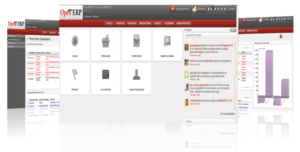OpenERP
 | |
 | |
| Original author(s) | Fabien Pinckaers |
|---|---|
| Developer(s) | OpenERP S.A. (previously Tiny sprl) |
| Stable release | 7.0 / December 22, 2012 |
| Preview release | current trunk version / daily |
| Written in | Python, JavaScript, XML |
| Operating system | Linux, Windows, Unix, Mac OS X |
| Type | ERP, CRM, Accounting |
| License | AGPL |
| Website | openerp.com |
OpenERP is an open-source enterprise resource planning (ERP) software actively programmed, supported, and organized by OpenERP s.a. OpenERP is similar to many open source projects where customized programming, support, and other services are also provided by an active global community and partner network.
OpenERP is an open source alternative to SAP ERP, Oracle E-Business Suite, Microsoft Dynamics, Netsuite, Adempiere, Compiere, OFBiz, Openbravo, and other enterprise resource planning software.
OpenERP is licensed under the terms of the AGPL license.
Business Applications
OpenERP includes the following modules and features:
- Sales Management
- Purchase Management
- Customer Relationship Management
- Project Management
- Warehouse Management
- Manufacturing
- Accounting & Finance
- Content Management
- E-commerce
- Asset Management
- Human Resource Management
- Fleet Management
- Event Management
- Social Network
- Point of Sale
- Knowledge and Document Management
- Calendar
- Expense Management
- Time Tracking
- Employee Appraisals
- Manufacturing Resource Planning
- Portal
- Employee Directory
- Address Book
- Recruitment Process
Industry Solutions
- OpenERP for Paper Industry
- OpenERP for Packaging Industry
- OpenERP for Hologram Industry
- OpenERP School Management System
- OpenERP Health & Hospital Management System
- OpenERP Best ERP .
[citation needed]
Architecture
OpenERP uses a Service Oriented Architecture as a software architecture design pattern.
Development Methodologies
OpenERP is developed using agile software development and Test-driven development methodologies.
Web Application Architecture

The most recent versions of OpenERP (including version 7) are mostly implemented as a web application. OpenERP includes an application server/web server (known as the OpenERP Server) that focuses on ERP business logic, stores data through an interface with a database, and web client for web browsers access. The server and business logic portion of OpenERP is primarily written in the Python programming language. The web client is primarily written in JavaScript.
Modules
Business features are organised into modules. A module is a folder with a pre-defined structure containing Python code and XML files. A module defines data structure, forms, reports, menus, procedures, workflows, etc... Modules can also contain web components written in JavaScript.
Database
OpenERP uses PostgreSQL as database management system.
Source code and contributions
OpenERP source code is hosted on the Launchpad project hosting web application, using the GNU Bazaar distributed revision control system sponsored by Canonical. The documentation is also managed using this service but is also published on a separate website.[1]
OpenERP Apps
OpenERP s.a. provides a web site referencing the officially supported modules as well as contribution modules.[2] Contribution modules can be referenced for free as long as they respect some submission rules.[3] As of November 2012, the number of OpenERP apps reached more than 2500.
Development environment
Module development mainly relies around editing Python and XML files. Some application logic (i.e. workflows and data structure) can be changed through the client interface using a developer mode.
See also
References
External links
| Wikimedia Commons has media related to OpenERP. |
- OpenERP.
- Collaborative development platform, Launchpad.
- blog, OpenERP.
- presentations and videos, OpenERP.
- TERP, text-mode OpenERP client, Google Code.
- Koo, a Qt based OpenERP client, NaN·tic.
- oerppy, a Python XML-RPC OpenERP client, Launchpad.
- Apps library, OpenERP.
- Pinckaers, F; Gardiner, G (2009), OpenERP for Retail and Industrial Management (1st ed.), Open Object Press.
- Aeroo Reports, a WYSIWYG HTML/Openoffice reports, Alistek.
- JERA Framework, Joomla! CMS integration, Alistek.
- New OpenERP Forum.
- OpenERP Books: http://www.openerp.com/catalog/157